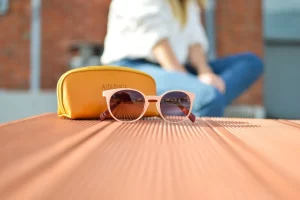
Shopping for the perfect sunglasses, you must’ve heard of the term acetate or nylon glasses – or something that emerged quite recently the titanium glasses. All these materials are upgraded forms of either plastic or metal glasses. And the eyewear, as a whole, is characterized into these two frame materials, everything else is basically the extract of plastic and metal frames.
Your choice for the perfect frame material depends on several things; your skin sensitivity, the load-carrying factor, personal preference, and a bit of concern for the price. Both plastic and metal frames have gone through several revamps and share their own pros & cons. But that again depends on the said factors.
One thing that keeps the statisticians concerned is the depleting trend of plastic frames despite so much improvement. And when we say the word “plastic”, we don’t necessarily mean conventional plastic, rather the upgraded versions of plastic sunglasses & eyeglasses.
Amidst this lack of approval for plastics, what leaves us and many other sunglasses lovers bothered is the resulting confusion while choosing between metal vs plastic frames.
Wondering what makes these frames so underrated? Are there any better alternatives to plastic sunglasses, or they really are worth your investment? And what sort of improvement we have seen in the conventional plastic frames over the years? Find the answers to your rightful concerns here as we explain why plastic sunglasses are underrated:
Plastic Sunglasses – Evaluating The Lack Of Approval
Several factors come into play when assessing people’s insufficient liking for cheap plastic sunglasses. Many believe it mainly stems from the bad reputation of these frames over the years. But lacking awareness of new & improved plastic frame models has equally contributed to it. Let’s evaluate each factor in detail:
1. Reputation of Plastic Sunglasses Over the Years
According to TheShadesHut, The conventional plastic sunglasses might have had an edge in terms of being hypoallergenic and lightweight. But experts believe the underlying flaws were enough for metal frames to get better of them. Have a look at some imperfections that brought bad repute to plastic frames:
Lightweight but Fragile
The initial plastic sunglasses were hailed for being a rather “comfortable” alternative to the hefty metal sunglasses. But soon, the lurking flaws exposed their fragility. Plastic frames turned out to be less flexible than metal ones and were susceptible to accidental drops or even minimal pressure. This in turn influenced their reliability as they were rendered way less durable compared to metal frames.
Cheap & Non-Allergic but Prone to Damage
Cheap plastic sunglasses initially worked as a great idea for those on budget. However, the idea couldn’t survive much because conventional plastic was massively prone to damage. Similarly, the absence of any allergic material made them well-suited for sensitive skins. But then again, plastics couldn’t bear even the slightest impact. Their thick, bold appearance could more easily display cracked frames and shattered temples. The ability to hold heavier lenses got equally compromised.
2. Lacking Awareness on Newer Plastic Sunglasses
The latest sunglasses frames in the market with the “plastic” label are made out of improved plastic-based polymers. These frames are now available in as many as 4 different types of plastics, each depicting its unique qualities.
For instance, cellulose acetate & propionate, the most widely used plastic frame types, are based on zylonite and nylon (respectively). Both these frames are lightweight yet remarkably flexible with excellent impact resistance.
The four main types of plastic sunglasses frames are:
- Cellulose Acetate (based on Zylonite)
- Cellulose Propionate (based on Nylon)
- Blended Nylon
- Optyl
Experts believe the improvements made in plastic frames may have gone unnoticed. The manufacturers possibly failed to garner the attention of the masses. Consequently, the lack of approval for plastic sunglasses continues to exist.
3. Improvements in Metal Sunglasses
While the plastic frames went through revamps and introduced upgraded versions, metal sunglasses also featured some notable improvements. Different alloys were combined in an appropriate proportion to form hypoallergenic metals. Have a look at some of the latest metal frame types:
Monel Metal Frames
Monel frames are prepared with Monel alloy, a composite of nickel, copper, and iron. Monel has some degree of being hypoallergenic that can be improved with the palladium coating. Monel is the most common material for metal eyeglasses & sunglasses, thanks to its sturdiness and corrosion-resistant nature.
Beryllium Frames
Beryllium is the cheapest of all the metal frame types. Beryllium glasses are extremely lightweight as compared to Monel, titanium, and aluminum. You can also find them in various colors and shades, just as the titanium glasses. However, some people have been reported to develop allergies to beryllium.
Titanium Frames
Titanium is the most modern & the ideal material used in metal glasses. Titanium frames are as strong as steel, fully hypoallergenic, highly impact-resistant, and thus super sturdy. The unique composition of titanium pairs allows a vibrant look with lively colors.
Plastic Sunglasses – What Does The Future Hold For Them?
Future has a lot to offer to plastic-based eyewear owing to the superb development in the quality. Manufacturers are actively incorporating the latest technology to ensure that comfort and durability go hand in hand. We’ll leave you with the few instances of the all-new plastic sunglasses variants that assure the promising future for this category ahead:
The Latest Variants Of Plastic Sunglasses
1. Cellulose Acetate
Based On: Cellulose acetate glasses are based on Zylonite alloy, aka “Zyl”, and are regarded as the best quality of plastic frames.
Benefits: Zyl frame sunglasses are extremely lightweight and offer superb flexibility, so they can be worn all day long.
Limitations: These glasses might be a little expensive as compared to the simple plastic frames, and rightly so!
2. Cellulose Propionate
Based on: These glasses are based on Nylon and thus can be easily shaped into different styles.
Benefits: Cellulose propionate offer the best durability in all plastic frames category due to the high quantity of Nylon; plus, they are suitable for all sorts of skin.
Limitations: These frames are a little sensitive to heat or extreme temperatures, but do well in moderate-to-high temperatures.
3. Blended Nylon
Based on: Blended nylon is a superior form of nylon that originated in the mid-20th century.
Benefits: These frames are super sturdy and withstand extreme temperatures.
Limitations: Although improvements are underway, due to remarkable stiffness, they might induce a load on the nose or ears if worn all day.
4. Optyl
Based on: Optyl glasses are based on duroplast, a synthetic material that can be regarded as a better form of cellulose.
Benefits: Their strength, durability, and hypoallergenic nature are way better than propionate & acetate glasses. Optyl is considered the most suitable frame for highly sensitive skins.
Limitations: Only a limited number of frames, that too of the Safilo group, are based on Optyl. So, make sure if you opt to buy them, you have enough bucks up your sleeve.








